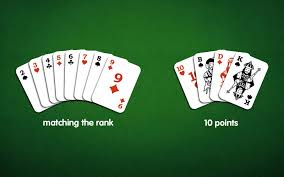Rummy Card Rules, is a timeless card game enjoyed across the globe. Its blend of strategy, skill, and a bit of luck makes it an engaging pastime for players of all ages. This guide will walk you through the essential rules of rummy, providing a foundation for both beginners and seasoned players.
Objective of the Game Rummy Card Rules
The main objective in rummy is to arrange all the cards in your hand into valid sets and sequences. The first player to achieve this wins the game.
Basic Terminology
- Meld: A valid combination of cards, which can be either a set or a sequence.
- Set: Three or four cards of the same rank but different suits (e.g., 7♠ 7♦ 7♣).
- Sequence: Three or more consecutive cards of the same suit (e.g., 5♠ 6♠ 7♠).
- Pure Sequence: A sequence without any joker.
- Joker: A card that can substitute for any other card to form a set or sequence.
Setup
- Number of Players: Rummy can be played by 2 to 6 players.
- Deck: Uses one or two standard decks of 52 cards, plus jokers.
- Dealing: Each player is dealt a specific number of cards. For instance, in a 2-player game, each player receives 10 cards; in a 3-4 player game, 7 cards each; and in a 5-6 player game, 6 cards each.
The Play
- Drawing a Card: On each turn, a player draws a card either from the closed deck (face-down pile) or the open deck (face-up pile of discarded cards).
- Forming Melds: After drawing a card, the player attempts to form valid sets and sequences.
- Discarding a Card: At the end of their turn, the player must discard one card to the open deck.
Winning the Game
To win, a player must:
- Form at Least Two Sequences: One of these must be a pure sequence.
- Declare: Once a player has formed the required sequences and sets, they can declare their hand. The player then places their cards face-up on the table, showing their combinations.
Detailed Rules
- Pure Sequence: A mandatory sequence without a joker. For example, 4♣ 5♣ 6♣.
- Impure Sequence: A sequence that can include one or more jokers. For example, 4♠ Joker 6♠.
- Sets: Groups of cards of the same rank but different suits. For example, 9♠ 9♦ 9♣.
Scoring
- Points Calculation: Each card carries a certain number of points:
- Face cards (K, Q, J) and Aces are worth 10 points each.
- Number cards are worth their face value.
- Jokers have zero points.
- Winning Hand: The player who declares first and has a valid hand gets 0 points. Other players’ scores are calculated based on the remaining cards in their hands.
- Maximum Points: The maximum points a player can lose in a single game is often capped at 80 or 100 points.
Variants of Rummy
- Points Rummy: A quick and straightforward version where each game is played for points, with each point having a pre-determined value.
- Deals Rummy: Played for a fixed number of deals, and the player with the highest score at the end wins.
- Pool Rummy: Players aim to avoid accumulating points, with the player having the lowest points at the end winning the game.
Tips for New Players
- Prioritize Pure Sequences: Always aim to form a pure sequence early in the game.
- Discard High-Value Cards: To minimize potential losses, discard high-point cards if they don’t contribute to any melds.
- Use Jokers Wisely: Save jokers for creating impure sequences or completing high-value sets.
- Observe Opponents: Keep an eye on the cards your opponents pick and discard to anticipate their strategies.
Conclusion
Rummy is a captivating game that combines strategy, skill, and a bit of luck. By understanding the rules and mastering the art of forming melds, you can enhance your gameplay and enjoy this timeless card game. Whether you are playing casually with friends or competing in tournaments, practice and patience are key to becoming a rummy master.




